AMD Zen 4 Ryzen 9 7950X and Ryzen 5 7600X Review: Retaking The High-End
by Ryan Smith & Gavin Bonshor on September 26, 2022 9:00 AM ESTCPU Benchmark Performance: Power, Web, And Science
Our previous set of ‘office’ benchmarks has often been a mix of science and synthetics, so this time we wanted to keep our office section purely on real-world performance. We've also incorporated our power and science testing into this section too.
In this version of our test suite, all the science-focused tests that aren’t ‘simulation’ work are now in our science section. Where possible these benchmarks have been optimized with the latest in vector instructions.
We are using DDR5 memory on the Ryzen 9 7950X and Ryzen 5 7600X, as well as Intel's 12th Gen (Alder Lake) processors at the following settings:
- DDR5-5200 CL44 - Ryzen 7000
- DDR5-4800 (B) CL40 - Intel 12th Gen
All other CPUs such as Ryzen 5000 and 3000 were tested at the relevant JEDEC settings as per the processor's individual memory support with DDR4.
Power
The nature of reporting processor power consumption has become, in part, a dystopian nightmare. Historically the peak power consumption of a processor, as purchased, is given by its Thermal Design Power (TDP, or PL1). For many markets, such as embedded processors, that value of TDP still signifies the peak power consumption. For the processors we test at AnandTech, either desktop, notebook, or enterprise, this is not always the case.
Modern high-performance processors implement a feature called Turbo. This allows, usually for a limited time, a processor to go beyond its rated frequency. Exactly how far the processor goes depends on a few factors, such as the Turbo Power Limit (PL2), whether the peak frequency is hard coded, the thermals, and the power delivery. Turbo can sometimes be very aggressive, allowing power values 2.5x above the rated TDP.
AMD and Intel have different definitions for TDP but are broadly speaking, applied the same. The difference comes from turbo modes, turbo limits, turbo budgets, and how the processors manage that power balance. These topics are 10000-12000 word articles in their own right, and we’ve got a few articles worth reading on the topic.
- Why Intel Processors Draw More Power Than Expected: TDP and Turbo Explained
- Talking TDP, Turbo and Overclocking: An Interview with Intel Fellow Guy Therien
- Reaching for Turbo: Aligning Perception with AMD’s Frequency Metrics
- Intel’s TDP Shenanigans Hurts Everyone
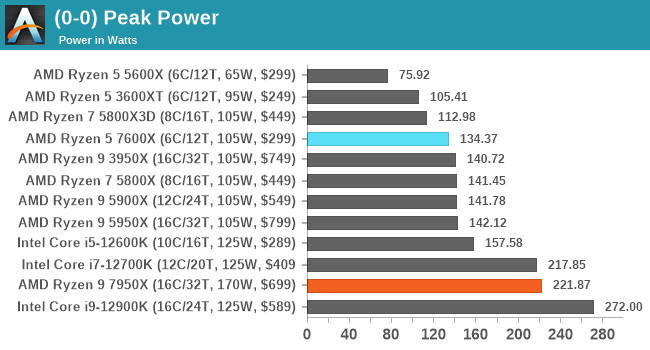
Looking at the results of our Peak Power test, the Ryzen 9 7950X topped out at 221.8 W, which is around 30% higher than the TDP of 170 W it comes with. As stated by AMD, the Power Package Tracking or PPT limit for AM5 motherboards when used with 170W TDP Ryzen 7000 SKUs will be 230 W. Still, while it draws more power than its generational predecessors such as Zen 3 and Zen 2, the Zen 4-based Ryzen 7000 series benefits from higher core clock speeds, a higher single core boost frequency, as well as other implementations around TSMC's 5 nm manufacturing process.
The AMD Ryzen 5 7600X is more aimed at the mid-range, and as such has a lower overall power draw, with the peak power figures in our testing reaching 134.3 W. This is around the same levels of power draw as the Ryzen 9 3950 X, the Ryzen 9 5900X, and the Ryzen 7 5800X. Per AMD's specifications, the Ryzen 5 7600X has a TDP of 105 W, with around a 27 % variance in peak power compared to TDP.
From our testing, so far, it seems that Ryzen 7000 when combined with a premium X670E motherboard allows for up to 30% in terms of extra power allowances for higher single-core boost and overall faster all-core frequencies.
Web
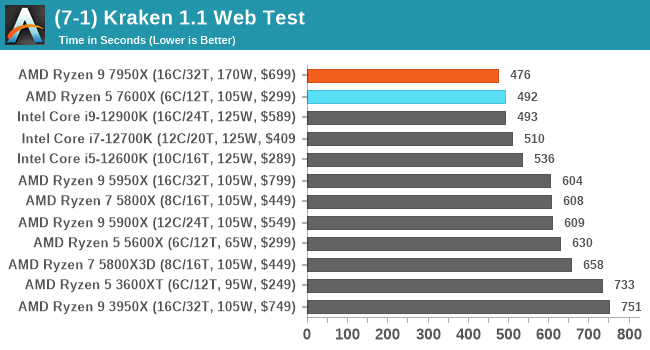
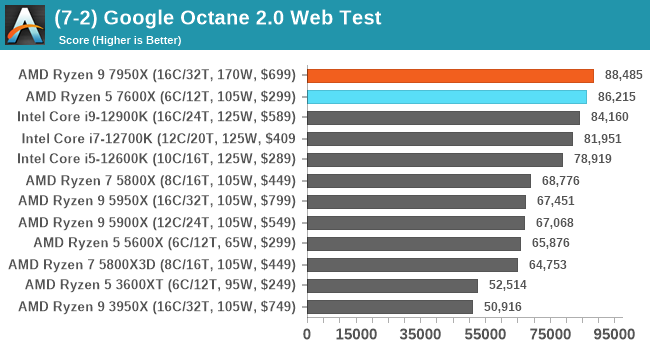
In our web tests, the overall improvements in IPC, frequency, clock speeds, and the switch to DDR5 all play a part in performance here. Both the Ryzen 9 7950X and Ryzen 7 7600X top our charts in regards to web testing, although performance isn't as apparent as it should be in other areas.
Science
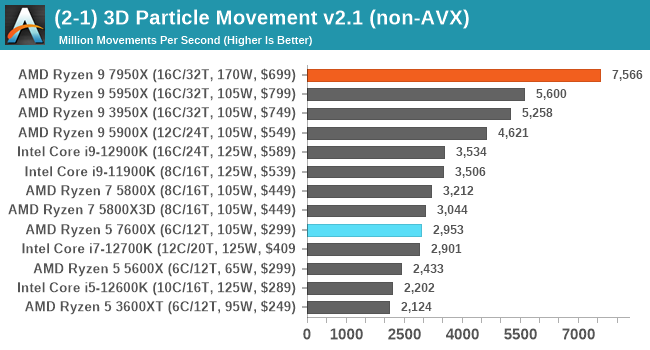
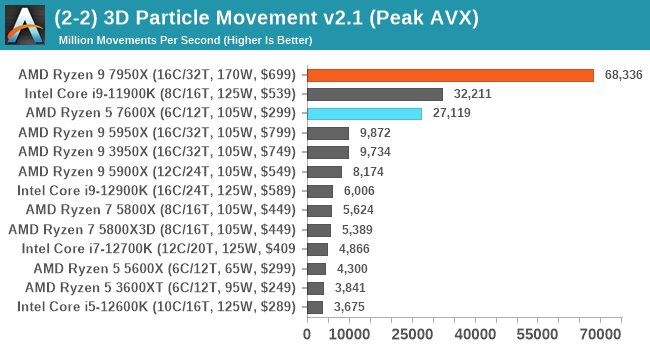
For our 3DPM v2.1 testing, we added in the Intel Core i9-11900K (Rocket Lake) to show performance across AVX workloads. Although Intel officially fused off the AVX2/512 extensions on Alder Lake which did cause a little controversy and gave the impression that AVX-512 on consumer platforms was dead. AMD clearly believes the opposite, as it has implemented it so that AVX-512 runs two cycles over a 256-bit wide instruction. The performance of the Ryzen 9 7950X here is phenomenal, although the Core i9-11900K which did indeed feature AVX instruction sets in the silicon, is still better than the Ryzen 5 7600X with AVX workloads.
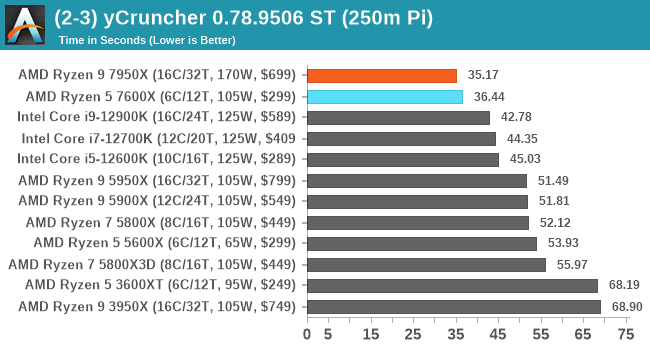
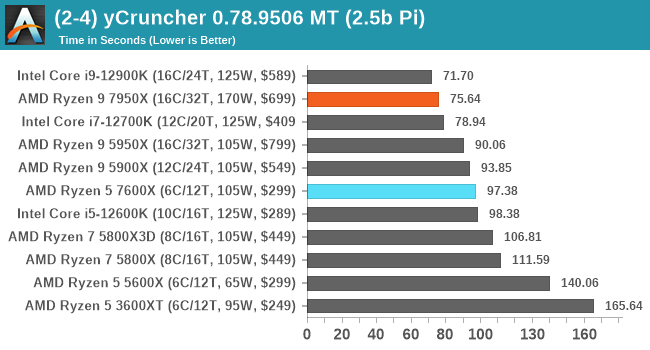
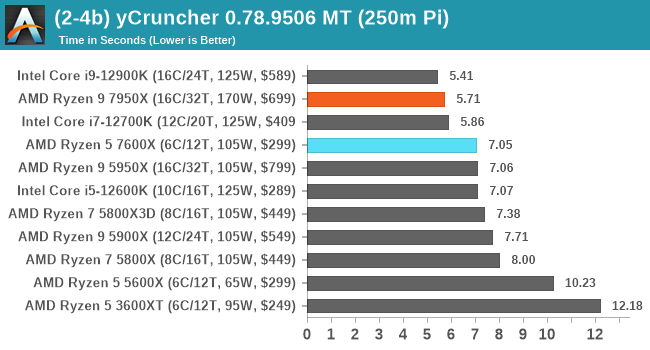
Focusing on our more science-based tests, both the Ryzen 9 7950X and Ryzen 5 7600X perform well against the competition. In our 3DPMv2.1 test in non-AVX, the Ryzen 9 7950X provided a jump of 35% in performance against the previous generation Ryzen 9 5950X processor.
Interestingly, in our yCruncher 0.78 test, the Ryzen 9 7950X and the Core i9-12900K trade blows consistently, although the Ryzen 5 7600X performs well for its price point.










205 Comments
View All Comments
vortmax2 - Sunday, October 16, 2022 - link
Some people don't want to limit TDP themselves. Nothing wrong with that. ReplyTechie2 - Tuesday, September 27, 2022 - link
What a screwed up launch of Ryzen 7000 CPUs and AM5 mobos by e-tailers. DDR5 EXPO DRAM showed up online a few days ago. On 9-27-22 it looks like e-tailers are actually hiding the four Ryzen 7000 CPUs to sell older stock. The AM5 mobos which have been sitting in inventory for weeks were not posted online until early morning instead of at midnight as in the past. You'd think by now they could figure out how to do a proper launch of a new CPU or platform but evidently not when it's AMD.No consumer grade Gen 5 SSDs listed by e-tailers that I could find. Are PC builders suppose to just wait until Nov. to see if they actually show up? AMD's partners may be cooperating with AMD but the purchasing experience is a piss poor sales methodology being employed IMNHO.
YMMV Reply
nandnandnand - Tuesday, September 27, 2022 - link
AMD said weeks ago that PCIe 5.0 SSDs would be coming in November.Nobody should be buying this stuff on day 1 unless they like being findom'd by corporations. Reply
yhselp - Tuesday, September 27, 2022 - link
First-draft-copy issues aside, this article is written exceptionally well. The information is excellent and extensive as usual, but I feel like there's been a step-up in the way its presented/explained. Kudos and thank you. Replyyhselp - Tuesday, September 27, 2022 - link
it's* goddamit Replyvortmax2 - Sunday, October 16, 2022 - link
Great post. So many grammar police on here that can't help but criticize and take away from the actual purpose of the article. ReplyHardwareDufus - Tuesday, September 27, 2022 - link
Clearly both manufacturers are producing vey compelling products this time around. At the $600-$700 mark we have two CPUs trading blows; R9-7950X (Zen4) & just announced i9-13900K (RaptorLake) We will have updates of both lines, with AMD adding 3D Cache and Intel increasing Boost Speeds. Probably can't go wrong with either choice, neither one dominates the other completely.I think I'll bite this time around. Yeah I know Zen5 will be a new architecture and Intel will adopt chiplets and all of the benefits that accompany them... But, I think either one of these chips, probably available in volume in 1st quarter 2023, will serve most folks well.
In the case of Intel, you can continue to use DD4 and 600 series chipsets. However really take advantage of the capabilities of the chip, DDR5 and motherboards featureing 700 series chipsets will be available, on par with Zen 4 requiring a DDR5 and otherboards featuring the new AM5 socket and 600 series chipsets. Apples to Apples when comparing the requirements to go ALL In on performance. Reply
HardwareDufus - Tuesday, September 27, 2022 - link
Dang, that was some awesome typing I just did there... Replynandnandnand - Tuesday, September 27, 2022 - link
3D cache will dominate over a couple hundred extra MHz in frequency (13900KS). ReplyHifihedgehog - Tuesday, September 27, 2022 - link
@nandnandnand: That may well be true, but that's the future and months out yet. Ryzen 7000 non X3D has to sell between then and now or AMD is not going to be posting a pretty quarter. The 13900K is far cheaper in platform and unit price and will meet or exceed the 7950X for now. DDR5 and AM5 motherboards coupled with a higher price will be Ryzen 7000 series undoing, and good too. AMD needs to realize people purchase because of intrinsic quality, not brand loyalty. Reply